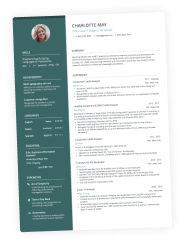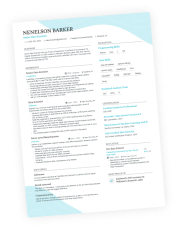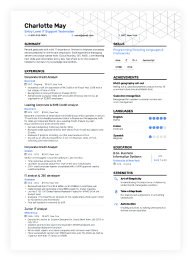Including references on your CV used to be the norm. Chances are, back in school, you learned to list three choice referees on this document or write the failsafe “references available upon request”. You know the drill. Or, at least, you used to.
However, times have changed and so have standard hiring practices. The first question you should be asking yourself is “should you put references on your CV in the first place?” If you’re not sure of the answer, you’ve come to the right place.
In the following guide, we’ll be looking at what a CV reference is, when it’s warranted, and how to format it properly. We’ve also got a selection of expert tips to help you navigate this issue.

Key takeaways
- Only include references on your CV if the job advert or sector requires them.
- Choose referees who know your work and can speak positively about your skills.
- Always ask permission before listing someone as a reference.
- Keep details brief: name, role, company, contact info, and your relationship.
- Never list friends or family—references must be professional contacts.
- Double-check all contact information and prep your referees in advance.
Is your CV holding you back? Find out whether your application meets industry standards and get a quick CV score now.
Is your CV good enough?
Drop your CV here or choose a file. PDF & DOCX only. Max 2MB file size.
Before we talk about how to include CV references, you need to know what they are.
What are CV references?
CV references are the contact details of professionals who can vouch for you. Hiring managers can reach out to these people and get a reference about your work. Referees—which is what these professionals are called—give hiring managers a clear, honest account of your character, abilities, and performance.
Why do references matter?
References provide hiring managers with proof of the claims you make. It’s all well and good saying that you were the top salesperson in your department, but can you prove it? While some employers will simply take your word for it, others will dig deeper and ask your references to back up these facts.
Since one in five candidates admit to having lied on their CV, it’s no wonder some hiring managers are suspicious. But don’t panic: Asking for references is just them doing their due diligence. It gives them a chance to make sure you have all the skills and experiences you’re saying you have.

Mistakes to avoid when listing references
Many candidates mess up when including references on their CV, but you don’t have to.
Don’t make these common mistakes:
- Mentioning them too early: References are not the main point of your CV. If you do list them, they should go at the bottom of the page.
- Listing friends or family members: Your best friend knows you better than anyone else, but they can’t vouch for your work. Referees should be professional contacts.
- Not prepping your referee: Thinking of adding a reference to your CV? Speak to the professional first and let them know. That way, they have time to prepare.
- Adding too many references: Aim to have up to three references on your CV. More than that can make it look like you’re stuffing the document.
- Writing “Available on Request”: It goes without saying that you will supply references if the hiring manager requests them. This wastes precious space.
- Failing to check contact details: Your referee’s email address or phone number may have changed. Be sure to check that it’s correct first.
- Surprising your referees: It’s always important to let referees know you’re listing them. We’ll cover exactly how to do that later in this guide.
Now you’ve got the basic rules, let’s talk about whether you should be using references anyway.
Should I include references on my CV in the UK?
Most of the time, the answer is no. In the UK, long gone are the days when references were a standard part of CVs. Hiring managers won’t typically expect to see them. Plus, adding them to your CV in the wrong instance could make you look out of touch with modern standards.
However, there are some times when you should add references:
The job advert specifically asks for them
The job advert trumps everything else. If the hiring manager has specifically requested that you have references, you need to list them. Failing to do so will make it look like you’ve not paid attention to the role and are, therefore, unserious about the job. Attention to detail is everything in the hiring world.
You’re applying to the public sector
Public sector roles are notoriously stringent. You can expect pre-employment checks, thorough referencing and employment history verification. When you’re applying for one of these positions, do your homework first. Having all of the information you need to hand will make the process smoother.
You’re going for an academic role
Similarly, academic roles tend to demand references. If you’re hoping to work at a university, for example, don’t be surprised if the team asks for referees. Typical references should come from your former academic mentors, advisors, and lecturers.
You’re submitting a speculative application
Going for a job that hasn’t been posted? If you’re cold-applying to your dream company, it’s your job to show you’re willing and ready to go above and beyond. Adding some high-level references to your CV could help you do just that. This shows that you’re well prepared and eager to impress.
You’re a freelancer or contractor
If you’re self-employed, you may find it hard to prove your worth to employers. Without a traditional backlog of experience, it could be difficult convincing them that you can do all you say. Adding references to your CV could be the answer. Glowing statements from former clients can instill trust in your work.

PRO TIP
If none of the above scenarios apply, leave references off your CV. The space you save will be better used to showcase your main achievements, core skills, and work experience.
Next up, let’s talk about what makes a good CV referee.
Who makes a good CV referee?
A good referee is someone who knows your work and can offer a clear account of it. Who springs to mind? If you’re not sure where to start, we’ve got you covered.
Strong choices include:
Ex-managers or supervisors
These professionals are the most obvious choices. Since they managed you directly, it stands to reason that they know your work better than anyone else. They can share details of your performance and skills, and also verify any professional claims you made. For example, if you talk about acing a specific project on your CV, they can elaborate on it and share how your contributions had an impact.
Colleagues or team members
While it’s less common to include coworkers, you can consider it in some circumstances. These professionals can explain how you work as part of a team. If you’ve supported a specific team member and you know you’ve impressed them in the past, they may make a great reference on your CV. However, think twice about simply listing your work buddy, especially if they haven’t worked directly with you.
Clients or customers
If you work for yourself, you are your own boss. That leaves you in a bit of a conundrum when it comes to adding references to your CV. You can’t—and shouldn’t—put your own details as a reference. However, you can ask trusted clients or colleagues to validate your skills. Make sure you pick a recurring client who knows your work and services well. Be clear about the relationship you have with the client on your CV.
Lecturers or academic advisors
Fresh out of college or university? You can list your lecturers or academic advisors as referees. They’re often stronger references than supervisors from part-time jobs. If, for example, you worked in a bar during your studies and have to choose between your lecturer and the bar manager, go with the lecturer. They can speak more directly to your academic abilities, work ethic, and potential in a professional setting.
Mentors
Similarly, if you’ve had a mentor—like someone you’ve shadowed or learned from in a work setting—they can make an excellent reference. A mentor who knows your interests, goals, and work habits can give employers a clear picture of your strengths and how you approach challenges.
Volunteer coordinators
Volunteer coordinators can also be valuable references if you've done any unpaid work. While you might not have had a formal manager, coordinators often oversee your tasks. That means they're in a good position to comment on how well you worked with others and how you handled responsibilities.
Remember, good references are not about filling space on your CV. Deciding to add someone to your application should be based on credibility. Only list professionals who will enhance your application.

Questions to ask yourself when choosing referees
Picking the perfect referee can feel like a minefield. But it doesn’t have to be.
When you’re figuring it out, ask yourself these questions:
- How well do they know your work? Ideally, you want your referees to be someone who understands your work firsthand in a professional capacity.
- Can they offer specific examples? Again, the professional should be able to offer specific examples that speak to your ability to do the job.
- Will they be positive about you? Your references should be people who you've impressed over your career. You want them to speak highly of you.
- Have they worked with you recently? Referees should have worked with you in the last three to five years. Any older than that, and hiring managers may see them as irrelevant.
- Are they comfortable being contacted? Speak to potential references before you put them on your CV. You need to make sure they’re happy with the process.
It goes without saying, but you should avoid using anyone you know personally, unless you also work with them in a professional environment. Don’t include people who don’t know your most recent work, or who are unlikely to give you a strong endorsement.

PRO TIP
Worried about an unfair job reference?
You might have heard that it’s illegal to give a bad reference in the UK. That is untrue.
Employers can share negative feedback about you—including the fact that you were fired or underperformed—so long as the reference is fair and accurate.
Additionally, they don’t have to write a long statement about you. References can be brief—for example, only including your title, salary, and the fact that you were employed.
Find out more about your reference rights on the government website now.
Chances are, if you need them, you’ve got a couple of referees in mind. But how can you make sure that they’re confident in being approached by hiring managers?
How to ask someone to be your reference
Here’s a quick rundown of how you can ask someone professionally:
Step 1: Contact them in advance
Before you put references on your CV, reach out to the professionals in question. You can either call them or send them an email. Either way, this is a crucial part of the process. Not only is it good manners, but it means that they won’t be caught off guard should a hiring manager contact them.
Keep things simple, be grateful, and always be polite. You may find that the referee comes back with questions so be prepared to answer them.
Step 2: Explain which role you’re applying for
Next, you’ll need to be clear about the role you’re going for. We’ve already covered this in the above example. If you’re calling a potential referee, don’t leave this vital detail out. They need to understand the nature of the job so that they know what elements of your work to talk about.
Step 3: Add some context for them
Context matters, especially when it comes to prepping referees. Offer to share details, such as your CV and the job advert or criteria. These materials will help the referee better understand the role you’re applying for, and make strong links between your experience and its demands.
You may also want to have a follow-up conversation about how your referee can help with the process. The more guidance you give them before they are contacted, the more likely they are to know what to say.
Step 4: Confirm they’re comfortable
Make sure you have either verbal or written confirmation that they’re comfortable giving you a reference. If you haven’t heard back from them once you’ve emailed, give it a few days and follow up to check.
When you’ve got that all-important confirmation, say thank you and then keep them updated. Should you plan on using them for multiple applications, you’ll need to ensure they’re okay with that.

Always go the extra mile
If your referees say yes, send them a short summary of your achievements or the work you did together to jog their memory. This makes their job easier.
The above steps may seem like a hassle, but they’re important. Following them means that your referees will expect the call, and will know how to handle it when it comes in.
Here’s an example for inspiration:
Email to a potential referee
Subject: Request to List You as a Reference
Dear John Smith,
I hope you're well. I'm currently applying for a marketing role at CVH Media, and wanted to ask if you'd be willing to act as a reference for me.
I’ve always appreciated your guidance during my time at Big Cat Ltd, and I believe you could provide a strong overview of my skills and work. If you're happy to be listed, I’ll include your name and contact information on my CV.
I’m also happy to share more details about the role I’m applying for, in case that helps.
Thank you in advance. Your support means a lot.
Best regards,
Daria Jones
Now you know what to do, let’s take a look at when you should prep your references:

When to prepare references
Of course, it’s important to prepare your references in advance. Let’s take a look at the best times to make sure they’re in order.
- When leaving a job or internship: If you’ve dedicated it’s time to move to a new job, it may be worth prepping some references. While you only need them in the scenarios we’ve outlined at the start of this guide, having them ready is a bonus.
- Before applying for a high-stakes role: Seen an advert for your dream job? It’s all hands on deck. Reach out to potential referees so they know what to expect.
- You're job-hunting after a career break: When you’ve had a career break, it’s wise to reconnect with your referees. Fill them in on your position and let them know that you’d like to use them as references on your CV.
When you’ve collated the references you need, keep them safe. Create a simple “References” document with the referee names, their roles, and their contact info. Having all of this ready to go when asked could significantly speed up the hiring process later down the line.
How to write references on a CV (if required)
If you need to list references on your CV, there’s a solid format you should use. This section needn’t take up too much space, and you want to keep the information brief without leaving anything out.
Use the following formula:
- Full name: The first and last name of your referee.
- Job title: Use the title they had when you worked with them.
- Company: Include the company, organisation, or university you worked at together.
- Professional email address: Get their professional email, not their personal one.
- Phone number: List a phone number.
- Your relationship to them: For example, “Former Manager 2022-24”.
Simple reference example
Janet Swift
Senior Operations Manager
Willow and Hurst
janet@email.com
+44 7700 9001XX
Former supervisor (2022–2024)
Follow the above formatting, and you can easily add referees to your next application. The golden rule is to make the information clear and easy to find.
Where should references go on a CV?
If your application does need references, you can add a separate section for them at the bottom of the page. Alternatively, you may want to add a separate page entirely, and label it “References”.
Make sure this section or page matches your CV’s layout. That means using the same font, style, and colours throughout. These small details can make a big difference.

Add a hyperlink for ease
If you’re submitting your references as a separate document, add a hyperlink in your CV header. That way, the hiring manager can quickly navigate to your references when they need to do so.
Ready to put all of our advice into action? Before you get to work, take a look at some key examples.
Good CV reference examples
Aim to include three references on your CV. If you don’t have that many, two should be fine.
Now, check out the CV reference examples for inspiration:
Example 1: For recent graduates
New graduates can include their lecturers, volunteer coordinators, and any other people who know them in a professional capacity.
Here’s how that could look on a CV, made with Enhancv:
Example 2: For a mid-career professional
If you’re in the middle of your career, you likely have a range of professionals willing to speak on your behalf. Choose direct managers or people of interest (like Heads) for the best results.
Take a peek at our mid-level career example:
Example 3: For a freelancer
If you’re self-employed, pick your referees based on how well they know you professionally. You’ll need to include the capacity you know them in, e.g. whether they’re a client or collaborator.
We’ve put together a prime example below:
Final checklist
Before you include references on your CV, ask yourself these core questions:

Questions to ask before you click send
- Has the employer asked for them? If the answer is no, you might want to think twice about wasting CV space on these details.
- Are your referees ready and willing? You should have already spoken to your referees and filled them in on your application details.
- Are their details up to date? Triple-check the basics, such as their email address and phone number.
- Do they reinforce what’s on your CV? Make sure the references you use back up every claim you’ve made on your application thus far.
- Would you feel confident if they were called today? How would it make you feel if a hiring manager reached out to these referees right now? If the thought makes you uneasy, you might want to contact them again or go back to the drawing board.
FAQs about references on a CV
If you’re considering adding references to your next application, you may have some final questions. We’ve answered the common conundrums below:
Can I use a friend as a reference?
No. You should not use a friend or a family member as a reference. The referees you list need to know you in a professional capacity.
How recent should references be?
Ideally, these should be professionals you’ve worked with in the last up to five years. The information they supply needs to be relevant to the role you’re applying for and up to date.
Can I be rejected because of a reference?
While it’s unlikely that you’ll get rejected based solely on a reference, a poor one can harm your chances. Avoid this issue by only including referees who are impressed by your work.
What if I don’t have any references?
If you don’t have any references, be aware of the risk. It may be worth finding a creative workaround, like offering character references or explaining the situation briefly.
Takeaway
You don’t always need to list references as default. However, for certain situations, you will want to have some handy. Consider who your ideal referee is and reach out to them. If it’s appropriate, use our advice to format your references on a CV. Make it easy and use our drag-and-drop AI CV builder now.



